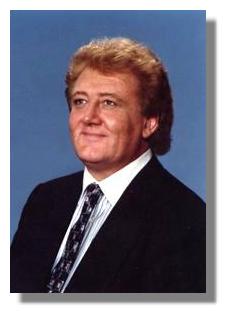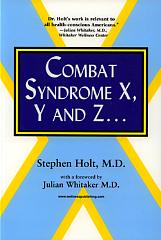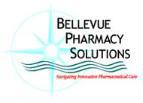Power Surge Live! Guest Chat
Thursday, Oct 30th
9 PM (ET), 6 PM (PT)
Menopause, Midlife And Syndrome X
STEPHEN HOLT, M.D.

Author of 12 Books Including
Combat Syndrome X, Y And Z
and the bestselling
The Soy Revolution
Menopause Doesn't Happen In A Vacuum
70 MILLION AMERICANS SUFFER FROM SYNDROME X
Syndrome X or the metabolic syndrome is a cluster (constellation)
of conditions that form a specific, health challenging entity.
Insulin resistance is a key issue in Syndrome X.
These conditions are:
• Obesity
• Hypertension
• High Cholsterol
• Glucose Intolerance, Insulin Resistance, Diabetes Mellitus
It is important to realize that these factors cause early
coronary artery (heart) disease. America's #1 Killer!
Stephen Holt, M.D.
author of 12 books, including
"Combat Syndrome X, Y and Z"
has practiced medicine since 1972 and throughout much of
his career he limited his practice to a hospital setting in academic
centers. Dr. Holt retired from full time hospital practice in 1995, to
peruse his career as a writer, scientist and member of the commercial side
of the health care industry. He maintains a small private practice in New
York and accepts patients by referral from other doctors only and he
practices tertiary medicine. Most of Dr. Holt's referred patients have been
seen by several physicians previously and they often have complex disorders.
Dr. Holt is a board certified gastroenterologist and internist, with higher
training in nutrition, clinical pharmacology and medicine of addictions.
Dr. Holt is a Member of the Royal College of Physicians (UK); Fellow of
the Royal College of Physicians of Canada; Fellow of the American College
of Physicians (U.S.); Fellow of the American College of Nutrition; Fellow
of the American College of Gastroenterology; Licentiate of the Medical
Council of Canada.
Dr. Holt is concentrating on the development of a medical teaching
curriculum for the Illinois College of Physicians and Surgeons, as the
President of this eclectic school of medicine. Dr. Holt practices
conventional medicine primarily, but he has described the concept
of "pluralistic medicine" and believes in applying many different forms of
medicine in patient management, including many forms of alternative
medicine, chiropractic, osteopathic, homeopathic medicine etc, often by
referral. Dr. Holt believes strongly in preventive medicine and the application of
natural, first-line options, in the absence of a medical emergency.
Dr. Holt is the author of twelve books, including his bestselling Random
House book, The Soy Revolution and Combat Syndrome X, Y and Z. and
the soon to be published, "The Meno Plan."
His other books can be found on Amazon.com.
Dr. Holt has published several hundred scientific communications and writes
for scientific, health care trade, consumer, pharmaceutical and popular
journals. He is a frequent guest in the media on national television and
radio and is interviewed frequently and quoted in scientific, trade and
consumer press.
AT THE END OF THE CHAT
FIVE LUCKY PEOPLE WILL WIN
FREE COPIES OF
"COMBAT SYNDROME X, Y AND Z"
Meet and talk with
Stephen Holt, M.D.
Thursday,
Oct. 30th
at 9 PM (ET)
in
Power Surge Live!
** Dearest **
Read the transcript here
*** *** *** *** *** *** *** *** *** ***
What Is Syndrome X?
*** *** *** *** *** *** *** *** *** ***
ASSESSING THE RISKS AND OCCURRENCE OF SYNDROME X
(THE SYNDROME X CLINICAL INDEX)
by Stephen Holt, M.D.
Syndrome X remains hidden in a large proportion of the population, perhaps
because many of its manifestations are comprised of "non-specific" symptoms
or signs. Periodic health examinations and screening procedures have
increased the detection of diabetes, high blood cholesterol, and
hypertension (the cardinal features of Syndrome X) but simple low cost,
screening strategies are required to detect people at risk for or with
Syndrome X. These strategies involve the development of screening
questionnaires combined with key medical findings that can form an "index"
for detection or diagnosis. I refer to the development of this diagnostic
index as the "Syndrome X Clinical Index."
The value of screening instruments for public health problems has been well
demonstrated over the past thirty years. Examples include screening for
alcohol or drug abuse and the development of risk indices for
cardiovascular disease. These diagnostic tactics are based on a combination
of clinical features (symptoms or signs) or laboratory indicators (e.g.
blood tests) of the disorder to be detected. Screening instruments, such as
these, work on a principle that the greater the number of disease related
symptoms or signs present in an individual, the more likely that the
individual has the disease in question.
My colleagues and I have developed several screening instruments to detect
alcohol or drug related problems and probe aspects of adverse lifestyle
(Skinner HA, Holt S, Schuller R, Roy J, Israel Y. Identification of alcohol
abuse using laboratory tests and a history of trauma. Annals of Internal
Medicine 101(6): 847-51,1984. Skinner HA, Holt S, Sheu WJ, Israel Y.
Clinical versus laboratory detection of alcohol abuse: the alcohol clinical
index. British Medical Journal 292(6537): 1703-8,1986. Holt S, Skinner HA,
Israel Y. Identification of alcohol abuse. II. Clinical and laboratory
indicators. Canadian Medical Association Journal 124(10): 1279-94,1981).
When developing these indices of disease detection there is a requirement
to validate the diagnostic accuracy of the components of the questionnaires
or clinical or laboratory indications of the disorder. In the case of
Syndrome X attempts have been made to construct questionnaires or lists of
medical tests with diagnostic ability, but these approaches have not been
validated for their accuracy in the detection of Syndrome X (best selling
books by Reaven G. and colleagues, Syndrome X, Challem J. and colleagues,
Syndrome X).
The table below proposes a combined "Syndrome X Clinical Index" that could
be used in clinical practice to detect the risk or likelihood of the
presence of Syndrome X. This detection program is based on medical
literature that describes strong associations of certain lifestyle issues,
symptoms and signs or medical findings in people with Syndrome X.
It is known that certain components of the combined clinical index for the
detection of Syndrome X (Syndrome X Clinical Index) will have greater
diagnostic ability than others. This diagnostic weighting of the components
of the Syndrome X Clinical Index requires measurement in population
research studies. In other words, certain questions or findings in the
index will have greater sensitivity and specificity for the diagnosis of
Syndrome X -i.e. they have greater powers of diagnostic discrimination;
where sensitivity implies the number of positive respondents that are truly
positive for the risk or for the diagnosis of Syndrome X, whereas
specificity refers to the number of negative respondents that are truly
negative for Syndrome X.
Symptoms
Symptoms of glucose intolerance, thirst, frequent urination, mental
clouding, etc.
Symptoms of complications of diabetes, e.g. changes in eyesight, sensory
loss, etc.
Irregular menstruation, infertility related to polycystic ovaries.
Lifestyle issues e.g. sedentary living, excess refined sugar intake, and
high-glycemic- index- type food intake, substance abuse.
Genetic tendencies, strong family history of components of Syndrome X
Gestational diabetes, diabetes in pregnancy.
Signs
Obesity, "pot-belly" or "apple shaped body contour." BMI greater than 30 or
more than 15 pounds overweight.
Skin manifestations of high blood cholesterol eg xanthelasma (cholesterol
deposits in skin).
Non-specific signs of diminished immune function e.g.: recurrent yeast
infection.
Poor pulses in peripheral circulation (arteriosclerosis)
Signs of the Polycystic Ovary Syndrome (Stein-Leventhal Syndrome), obesity,
acne, excess of body hair in young females etc.
Eye disease, cataracts, changes in the retina.
High blood pressure sustained at greater than 140/85 mmHg. Laboratory Tests
Fasting blood glucose greater than 110
Blood glucose higher than 140, two hours after the start of standard
glucose tolerance test.
Fasting HOL cholesterol lower than 35
Fasty triglyceride greater than 200
High total blood cholesterol with raised LDL of "dense type"
Table of the Components of the Syndrome X Clinical Index.
The components of a combined clinical index for the detection of Syndrome
X. The diagnostic "ability" of the proposed questions or findings has not
been defined in field research. Any of these findings may variably assist
in the detection of Syndrome X and the greater the number of these
indicators that are present the more likely that Syndrome X is present or
may develop. In general, laboratory tests have a high sensitivity and
specificity for diagnosis.
*** *** *** *** *** *** *** *** *** ***
Lifestyle Changes Can Promote Health
And Longevity
*** *** *** *** *** *** *** *** *** ***
• Lifestyle changes can promote health and longevity.
• Maintain an optimal weight.
• Control elevated blood pressure.
• Engage in physical activity.
• Do not smoke or inhale secondary smoke.
• Reduce your dietary intake of saturated fat, simple sugar and cholesterol
by moving towards more vegetarian sources of protein. INCREASE FIBER
INTAKE*
• Pay special attention to your psychological well-being.
• Do not use dietary supplements as a way of supplementing a lousy diet.
• Remember the mirror principle in life: your input is your return.
• Moderation in most pleasures is advisable.
• Use natural substances to promote cardiovascular well-being. Click here for
the Secret of Soluble Fiber.• Conventional medicine, when applied appropriately, has immense advantages
for health.
• Natural approaches can often be the first line option for wellness.
*** *** *** *** *** *** *** *** *** ***
Drugs
*** *** *** *** *** *** *** *** *** ***
Drugs can be valuable but they may not be FIRST LINE OPTIONS for
SYNDROME X or its components.
Insulin injections were at one time the only way to treat diabetes. Drugs
became another option but both of these approaches are best used only after
applying lifestyle change with diet and exercise. Drugs used to treat type
2 diabetes have side effects e.g. weight gain with sulphonylurea drugs,
gastrointestinal upset with metformin etc. Sometimes side effects are
serious. Cost and side effects of drugs are reasons to try FIRST LINE
OPTIONS OF NUTRITION, EXERCISE AND OTHER LIFESTYLE CHANGE.
Drugs are not first line options to lower blood cholesterol. Again,
nutrition and lifestyle change are the FIRST LINE OPTIONS TO LOWER
CHOLESTEROL. Cholesterol lowering drugs have side effects and they are
expensive. "Statin" type drugs cause liver damage and sometimes serious
muscle disorders.
Drugs effectively lower blood pressure but lifestyle change may be quite
effective e.g. supervised exercise, smoking cessation, etc.
Drugs to combat obesity are a last resort. Many have been removed from the
market because of serious side effects e.g. heart disease. Ephedra
(MaHuang) is not safe.
Nutrition and lifestyle change are FIRST LINE OPTIONS and they are
VERSATILE.
EXTRACTS OF SOLUBLE FIBER HELP LOWER BLOOD CHOLESTEROL,
BALANCE BLOOD SUGAR AND HELP WITH WEIGHT CONTROL.
********
Read the transcript of last week's chat
on Menopause, Midlife, Hypertension &
Cardiovascular Disease
with
Mark Houston, M.D.
********
Share Support, Information And Friendship On
The New, Updated Web Site's Message Boards
/php/forum/index.php
********
Hundreds of Experts In The Area Of Women's Health
Have Visited Power Surge . . .
Many More Are Coming!
See the Power Surge Guest Schedule
*****
Check out the
informative articles in
Educate Your Body
Dozens of menopause-related subjects
********
Have questions?
Ask Power Surge's Experts
********
Ten Years of Helpful Menopause Treatments
Power Surge Recommendations
*** *** *** *** *** *** *** *** *** ***
SAFE AND EFFECTIVE SOY PROTEIN
AND ISOFLAVONES FOR TREATING MENOPAUSE
*** *** *** *** *** *** *** *** *** ***
The one thing that eliminated my hot flashes, depression,
fatigue, vaginal dryness, mood swings, lowered my
menopause-related cholesterol by over 100 points and
generally gave me back my life the past 5 1/2 years has
been doctor-formulated Revival Soy Protein. I've seen Revival
help not only me, but thousands of other women experiencing the
typical symptoms of perimenopause. Soy is SAFE and has been
used as a staple in the diet of Japanese women for thousands of
years. They are considered among the healthiest women in the
world. Soy is effective and reliable, especially for those who can't
or choose not to use hormone replacement therapy. The FDA
approves the use of SOY in lowering cholesterol and providing
general heart health. It's made from non-genetically engineered
soybeans. Most of the soy products on the market are genetically
modified. Revival is made from the isoflavones are taken from the
heart" of the soybean where isoflavones are most concentrated.
Read more about my personal story
Ask Medical Director, Aaron Tabor, M.D. anything at
Ask The Soy Doctor
Read Dr. Tabor's last transcript
********
Soy Isoflavones (Revival Soy), vitamins, herbs, creams,
naturally compounded "bio-identical" hormones
(molecularly identical to those your body produces)
compounded by Power Surge Pharmaceutical Consultant
of 8 years, Pete Hueseman, R.Ph., P.D.
and The Women's Active Multi Vitamin
contains every vita-nutrient a midlife woman needs
|








